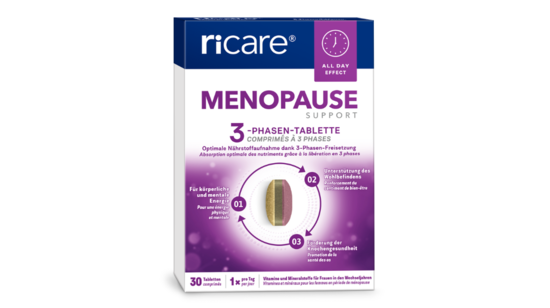Sex in later life? A taboo subject for many, but here's the reality: Sexuality remains a vibrant and relevant aspect of life even after the age of fifty. The notion that your desire to have sex vanishes with the menopause is simply untrue. Studies show that many women continue to have a fulfilling sex life even after the menopause. But what factors influence sexuality in the second half of life?
There are three factors that influence our sex drive after the menopause
-
Our own health and that of our partner
Chronic illnesses such as diabetes or arthritis can reduce sex drive, as can financial worries or psychological stress. Women who are financially stable and in good health often also have a more active sex life.
-
Attitudes to sex in the first half of life
Was sex a duty or a joyful experience? Those who can recall positive experiences in the past are more likely to take them into old age.
-
The hormones after the menopause
Hormone balance plays a crucial role. Women who use hormone replacement therapy often report increased libido and better sexual experiences. Studies show that hormone levels influence how women rate their sexuality.
1. "Women over 50 don't want sex any more."
Wrong! Many women continue to have an active sex life after the menopause. A French study shows that women on hormone replacement therapy often continue to see sexuality as crucially important.
2. "Older people don’t engage in physical affection like they used to".
Another misconception. Sex later in life is wide and varied and doesn't have to involve penetration. Many women say that they enjoy masturbation or oral stimulation well into their seventies. The definition of sexuality broadens with age.
3. "Sex is like riding a bike – you never forget".
This is only partially true. If you haven't had sex for some years, you may be surprised when you do so again, especially in light of hormonal changes. Thinning of the vaginal skin can cause pain, which is why it makes sense to take preventive measures such as using estriol creams or doing pelvic floor exercises.
What helps ensure a fulfilling sex life post-menopause?
-
Hormone replacement therapy: Can help to increase libido and reduce vaginal dryness.
-
Sex toys: Vibrators and other aids can help to increase sexual arousal.
-
Pelvic-floor exercises: Strengthen the muscles and enhance sensation during sex.
-
Open communication: Talking about needs and desires with your partner can help dispel insecurities.
Sexuality is not about age, it's about mindset and well-being. A fulfilling sex life can be a source of joy and satisfaction even after the menopause. The key message: Sexuality does not end in later life – it keeps evolving!
Sexuality in later life is often a taboo subject, but does remain an important part of life even after the menopause. This article highlights the key factors that influence libido after the menopause, debunks common myths and offers practical tips for a fulfilling love life. Find out why sexuality does not end in later life, but keeps evolving!




